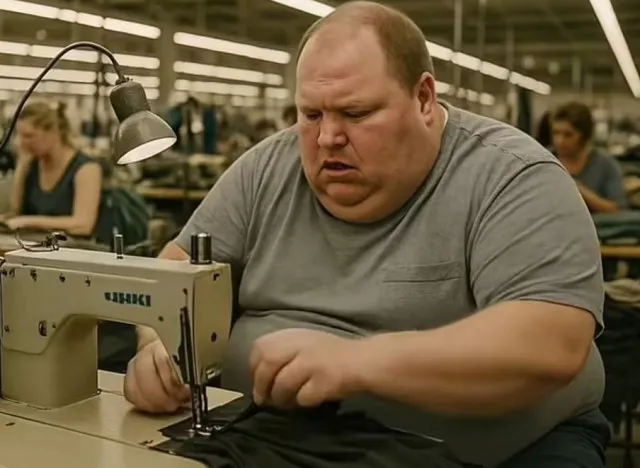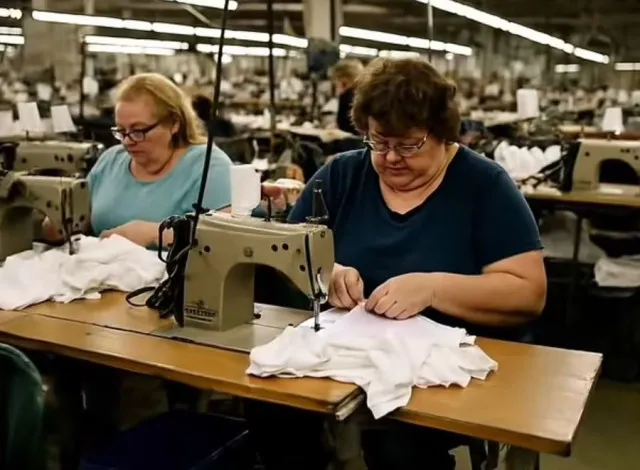In today’s hyperconnected world, propaganda doesn’t look like it used to. Forget grainy war posters or long-winded state speeches—now it’s AI-generated TikTok clips, dripping with sarcasm and satire, designed to provoke and go viral. That’s exactly what happened this week when a short video out of China started making waves across social media.
At the center of the storm? A bizarre, 32-second AI video that mocks Donald Trump’s tariff policies, portraying a dystopian vision of American life under economic pressure. And let’s just say—it struck a nerve.

The AI Clip That Took Over the Internet
The video was originally posted by TikTok user @BenLau, a Chinese creator known for political content. This wasn’t just another meme. It was a full-on digital roast, showing overweight, exhausted American workers trapped in mindless factory labor, as somber Chinese music played in the background.
The twist? It blames this bleak reality on Trump’s well-known “America First” and tariff-heavy trade strategy. And it closes with a darkly comedic zoom-in on a worn-out MAGA slogan, as if to say, “This is what you asked for.”
The visuals were clearly exaggerated, but the message wasn’t subtle. The takeaway? Trump’s plan to bring jobs back to the U.S. is, according to this video, a backward move that hurts more than it helps.
Video: Chinese TikToker releases AI mocking Trump tariffs
Reactions Pour In: Offended, Amused, Divided
It didn’t take long for the clip to get reposted on X (formerly Twitter), and from there it exploded. Thousands of users weighed in—some with biting sarcasm, others with genuine outrage, and quite a few with uncomfortable agreement.
One comment simply read: “The bully has been bullied.”
Another joked: “He’ll care when they start mocking his golf swing too.”
A third added: “They import way more to us than we do to them. Sick of their cheap junk.”
But others saw the video as brutally accurate. “This is exactly how the rest of the world views us,” one user wrote. “And maybe we should take that seriously.”
The polarization was sharp—but so was the reach. The video went global in hours, and its impact shows just how influential a few seconds of AI-generated content can be in shaping political conversations.

Why It Hit a Nerve: The Bigger Picture Behind the Mockery
The timing of this viral hit was no accident. It came just as Trump announced a massive increase in tariffs on Chinese goods—raising them to an effective rate of 104% starting this week. That’s not a typo. Over 100% tariffs on certain imports.
This spike combines a new 50% tariff with reciprocal duties that were already in place. It’s part of Trump’s escalating fight to reassert U.S. dominance in global trade—and it’s not sitting well with Beijing.
In response, China seems to be testing new strategies of its own—not with tanks or threats, but with memes and mockery. It’s a modern information war, and social media is the battlefield.

The Real Question: Can Tariffs Bring Back American Manufacturing?
Strip away the satire, and this whole conversation drills down to a serious debate. Can tariffs actually bring jobs back to American soil—or are we romanticizing a version of the economy that no longer exists?
Trump’s team insists that tariffs are necessary leverage—a way to level the playing field and protect U.S. industries from being undercut by cheap foreign labor and goods. His press secretary Karoline Leavitt even said they’ll “fight to the end” to defend American workers.
Critics, however, argue that the global economy isn’t that simple anymore. Supply chains are complex, products are international, and slapping tariffs on imports might end up hurting U.S. consumers more than helping U.S. businesses.
Meanwhile, AI-generated satire like this video doesn’t just stir emotions—it frames the conversation in the court of public opinion. It plants doubt. It sparks debate. And it spreads like wildfire.

Why This AI Video Matters More Than It Seems
Sure, it’s just a short video. But its implications are huge.
First, it shows how AI can now be weaponized to influence perception in ways that are faster and harder to control than ever before.
Second, it highlights how international players are adapting to modern propaganda, choosing memes and humor over old-school tactics.
And third, it shows that global audiences—on both sides—are watching U.S. politics unfold like a viral series, complete with memes, villains, and plot twists.
Video: Make america great again~#tariff #america
Conclusion: Satire, Strategy, and the Future of Political Messaging
What started as a 32-second jab from a Chinese TikTok account has grown into a symbol of global friction. It’s not just about tariffs. It’s about how countries talk to each other in the digital age—with AI, irony, and internet clout.
Whether you think Trump’s policies are bold leadership or economic suicide, this video hit on a truth: in today’s world, optics matter just as much as policy.
And if we’re not paying attention to the messages going viral—whether they’re made by humans or machines—we’re already behind.